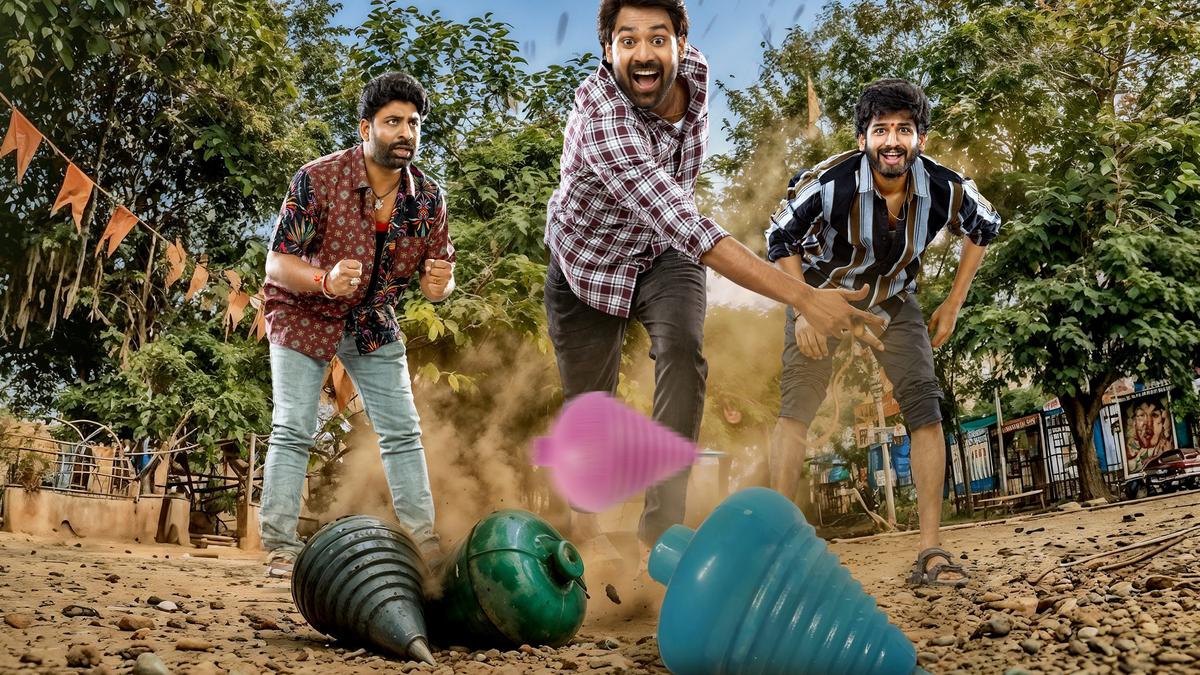
Rajkumar Kasireddy, Nithiin Narne and Ankith Koyya in âAayâ
| Photo Credit: Special Arrangement
In the Godavari belt in Andhra Pradesh, âaayâ, uttered at times in a sing-song tone, is a word that stands for acknowledgement. The Telugu film Aay, with the tagline âMem friends andiâ (we are friends), written and directed by Anji K Maniputhra, is a tale of friendship and romance steeped in the regionâs flavour, with an undercurrent of caste divisions. Anji keeps the tone lighthearted while conveying that relationships can overcome deep-rooted caste barriers.
Aay (Telugu)
Director: Anji K Maniputhra
Cast: Nithiin Narne, Nayan Sarika, Ankith Koyya, Rajkumar Kasireddy
Storyline: A slice-of-life story of friendship, romance and caste divisions in the Godavari region.
The film is set in Amalapuram during the monsoon season. The rains witness random ramblings among friends, the first brush of romance and family ties that have turned sour. Karthik (Nithiin Narne) comes home sometime between the first and second lockdown, since working from home is the new norm. His childhood buddies Subbu (Rajkumar Kasireddy) and Hari (Ankith Koyya) are still loitering around aimlessly.Â

Anji is in no rush. Just like the small town that plods along at its own pace, soaking in the seasonâs rains, the film moves at an unhurried pace, capturing the lifestyles of people in the locality. How the village folks view the concept of working from home, leads to a few fun moments. Humour woven around day-to-day happenings keeps the momentum going.Â

Nayan Sarika and Nithiin Narne
When Pallavi (Nayan Sarika) enters the picture, things begin to change between the friends. Still, Anji keeps things breezy and simple. Slowly, the director unravels the deeper issues. When Pallavi confesses that she grew up in a household concerned with caste-driven relationships and hence did not think of crossing the line, she is presented as someone with a practical approach. The foreboding of honour killing is hinted at, but the film holds back from discussing the dark possibilities.
The humour that pervades through the film is both its strength and Achilles heel. In the later portions, when gags punctuate even potentially serious moments, it dilutes the gravity of the situation. A running gag featuring an elderly man hooked to innuendo-laced videos, for instance, gets repetitive.Â

Even among the three friends, some comic portions feel trivial and stretched after a while. But the camaraderie between the trio and the performances, especially by Rajkumar and Ankith, makes up for it. Rajkumar is gregarious, as required for his character and gets some of the best lines. Ankith, as a trustworthy friend, except when he gets distracted by his lady love, enacts his part effectively. After last yearâs campus hit MAD, Nithiin takes on the mantle of a solo lead. He is adequate and there is scope for improvement. Nayan Sarika has an easy screen presence. The supporting actors, particularly the parents, portray everyday scenarios as lived-in and real. Ram Miriyalaâs music, Ajay Arasadaâs background score and Sameer Kalyaniâs visuals complement the raw, rustic beauty of the Godavari region.Â
In the final portions, when the narrative moves into a zone where caste issues need to be addressed emphatically, it sidesteps the predictable route and does something that aligns with the tagline of the film. Perhaps this is the directorâs way of stating that the need for social change can be highlighted through lighthearted narratives and still be effective. In these times of overdose of bloodshed on screen, this approach is refreshing.
Aay is currently running in theatres
